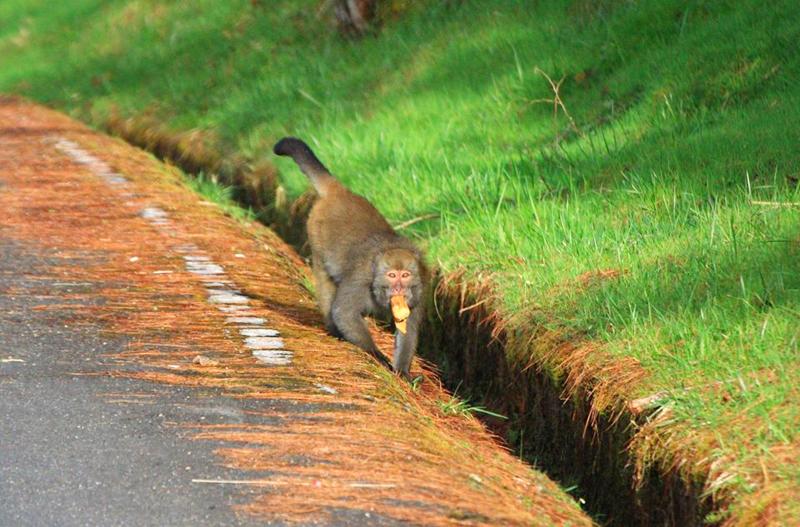The Tataka Recreation Area in Yushan National Park attracts almost 700,000 visitors every year. We are now in the breeding season for Formosan macaques, and you can often see macaques of all sizes running around in the area. Unfortunately, there are also many examples of members of the public feeding the animals, which is against the regulations. Some individuals, disregarding calls not to do so, have been given tickets for throwing food at the animals through their car windows. This behavior not only teaches the macaques not to be afraid of people and to come to rely on visitors for food, it can also cause physical harm to the macaques, or encourage them to jump into vehicles and fight with the occupants. According to the Yushan National Park Administration Office, feeding the macaques illegally can result in a fine of up to NT$3,000, and it called on visitors to obey the regulations if they travel to the area over the Qingming Festival long weekend, or they might find themselves out of pocket.
According to the office, macaques generally travel around in groups, and there have been cases of people who have had macaques enter vehicles with the windows left open in the recreation area’s Shihshan Car Park, and the animals have destroyed the food and clothing in the vehicles. In the past there have even been cases where the monkeys have stolen items or sat on the roof of a vehicle. If members of the public are injured by the macaques, there is a real danger of the humans being infected with a zoonotic disease.
In addition, visitors feeding animals may influence those animals’ behavior patterns and reduce macaques’ level of wariness of humans, and this could lead to their playing along roads, thus increasing the chances of them being killed by oncoming vehicles. This would also constitute a danger to road users.

Photo courtesy of the Yushan National Park Administration Office
照片:玉山國家公國管理處提供
(Translated by Paul Cooper, Taipei Times)
玉山國家公國塔塔加園區,每年吸引近七十萬人次造訪,近期正逢台灣獼猴生育季節,常見大小獼猴活動,但民眾違規餵食情況也增多,甚至有人不聽勸,頻頻在車上丟食物餵獼猴而吃上罰單,由於此舉不僅養成獼猴不怕人,依賴外界餵食,也容易造成獼猴身體負擔,或是闖入車內與遊客發生衝突,玉山國家公國管理處強調,違規餵食最高可處三千元,呼籲遊客清明連假上山務必遵守規範,以免荷包失血。
玉管處表示,獼猴經常群體活動,就有民眾在園區石山停車場因車輛未關窗戶,遭台灣獼猴闖入車內,破壞車內食物、衣物等情形,過去甚至曾發生動手行搶、霸佔車頂等,若有遊客不慎受傷,很可能出現人畜共通傳染病的風險。
此外,民眾餵食會影響動物習性,容易降低獼猴對人的戒心,導致獼猴喜歡跑到道路嬉戲玩耍,不僅可能增加被路殺的風險,也危及用路人的安全。
(自由時報)

In a remote area of South Australia lies Coober Pedy, a seemingly deserted mining town. But don’t be fooled by its surface appearance — around 60 percent of the town’s population have made their homes underground. The town was first established in the early 20th century, after a teenager found opal gemstones there. This discovery transformed the town into the world’s opal mining center, drawing miners from far and wide. The town’s unique underground community took shape as a response to the harsh climate, where average summer temperatures can soar to 38°C. Using basic mining tools, the residents dug holes

A: Muslims around the world are celebrating Eid al-Fitr this week. B: Wiil there be any celebrations in Taipei? A: Sure, the “2024 Eid al-Fitr in Taipei” is set for this Sunday. B: Where will the event be held? A: It’s going to take place from 11am to 5pm at Daan Park in Taipei. We can go together if you’d like. A: 全球的穆斯林本週正在慶祝「開齋節」! B: 台北市也有慶祝活動嗎? A: 當然啦,「2024尋味台北 齊賀開齋」即將在週日登場。 B: 要去哪裡參加活動啊? A: 活動將從上午11點到下午5點,在大安森林公園舉行,我們一起去吧。 (By Eddy Chang, Taipei Times/台北時報張聖恩)

Everyone has seen a piece of fruit turn brown after being cut. Have you ever wondered why that happens? It is a common phenomenon that occurs due to a chemical reaction called enzymatic browning. The appearance, flavor and nutritional value of the fruit are all affected by this reaction. Some fruits, such as apples, pears, bananas, avocados and peaches, are more prone to enzymatic browning than others. These fruits contain high levels of an enzyme called polyphenol oxidase, or PPO for short. __1__ This causes a chain of chemical reactions that ultimately transforms the phenolic compounds into

A: As well as Eid al-Fitr, Southeast Asia is celebrating the Water Festival this week. B: And this year, Thailand is expanding the celebration between April 12 and 16 for the event, officially known as the Songkran Festival, expecting to make 24.3 billion Thai baht in tourism revenue. A: Does Taiwan celebrate the Water Festival? B: Some local cities and counties do have similar activities. A: Let’s go experience the festival then. A: 除了「開齋節」外,東南亞「潑水節」本週也盛大登場! B: 泰國今年從4月12日到16日擴大「宋干節」連假,預估觀光收入可高達243億泰銖。 A: 台灣會慶祝「潑水節」嗎? B: 有些縣市會舉辦類似活動。 A: 那我們也去體驗一下吧。 (By Eddy Chang, Taipei Times/台北時報張聖恩)